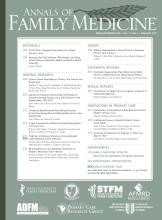With this issue of Annals of Family Medicine, we launch a new feature to help readers build learning communities to improve health through enhanced understanding of primary care. We call it the Annals Journal Club, but this is not your old journal club. Rather, we encourage you to use this feature to develop your own RADICAL journal club. RADICAL is an acronym for Read, Ask, Discuss, Inquire, Collaborate, Act and Learn. We invite diverse groups, including students, residents, faculty members, practicing clinicians, health care workers, patients, and others to create forums for discussion and action.
Journal clubs have a long history as a structured forum to teach critical appraisal, transmit clinical information, and stimulate interest in research.1–5 Journal clubs include many local adaptations, but those that enjoy high attendance and longevity are more likely to involve food, mandatory attendance, strong perceived importance by a leader, formal teaching of critical appraisal skills, an emphasis on original research articles, and promotion independent of faculty.6,7 A recent systematic review identified 3 “best practices” for journal clubs: (1) use of a structured checklist, (2) explicit written learning objectives, and (3) a formalized meeting structure and process.8
These traditional approaches work well for many groups; however, the crises in our health care systems call for moving beyond tradition. It is time to use our evolving generalist evidence base to nurture the radical thinkers and leaders that must emerge if we are to build a future that assures equitable, quality, sustainable, personalized, integrated health care. The Annals Journal Club can be one forum where those who care will meet, share, learn and create change.
With each issue, the Annals Journal Club will select an article or articles and will identify questions to ignite reflection and conversation. We offer the Annals online discussion forum, called TRACK, as a way for local journal clubs to share their insights and conversation themes, and we will highlight commonalities or uniquely important ideas in our regular editorial synthesis called On TRACK. Comments submitted within 3 weeks after publication of an issue of Annals will have the greatest chance of being referenced in On TRACK.
Starting with this issue, journal club questions will appear on the inside back cover of the print version of Annals. In the online Annals, links to the questions are located at the top of the article and in the table of contents. Typically, questions will address the following 8 domains:
-
Issues addressed by the article—What is the research question? Why does it matter? How does it fit with what already is known? How can it help solve important problems for practice or policy?
-
Design of the study—Is the study design appropriate for the question and what already is known about the question?
-
Study methods—To what degree can the findings be accounted for by:
How participants were selected?
How key variables were defined and measured?
Confounding (false attribution of causality because two variables discovered to be associated actually are associated with a third factor)?
How information was interpreted?
Chance (as indicated by inferential statistics)?
-
Main findings—Does this study advance current knowledge?
-
Generalizability—How transportable are the findings to other settings, particularly to my patients, practice and community?
-
Implications—How can the information be used to change practice, policy or training?
-
Constituencies—Who are the constituencies for the findings, including patients, and how might they be engaged in interpreting or using the findings?
-
Next steps/new questions—What are the next steps in interpreting or applying the findings? What new questions arise and how might they be best answered?
Although we recognize that organizers will need to run the journal club in a way that works locally for their particular participants, we suggest a few ground rules:
-
Schedule regular meetings of your RADICAL Journal Club every other month, shortly after the Annals of Family Medicine is published free online (the fourth Tuesday of alternating months: January, March, May, July, September, November).
-
Share the expectation that everyone will read the article in advance. If necessary, make time at the beginning of the session for people to read.
-
Identify an enthusiastic and reliable convener, but treat leadership of the group process as a shared responsibility. Try to engage a variety of participants, including clinicians from different fields, other health care workers, patients, researchers, administrators and content experts.
-
If your journal club develops insights that might be useful to others, consider identifying a participant to succinctly write the transportable lessons from your discussion and post them on the Annals TRACK online discussion, as a student journal club did several months ago.9,10
-
Use the Annals Journal Club questions as a springboard for your own discussion, but do not be limited by them. Come up with your own; make it real for your local context, but think about the big picture too. Find the meaning for your situation and the problems and opportunities you see.
-
Create a conversation. Listen, talk, share, explore. Seek expertise and insights from all sources. Have fun.
-
Consider what individual or collective action you wish to take and TRACK to report what happens.
The word radical derives from radix, meaning root. We hope the Annals Journal Club and its RADICAL approach will nourish the deep roots of generalism and primary care and uproot that which needs challenging and change. It is time to get RADICAL. In summary:
-
Read the article critically
-
Ask the key questions for yourself
-
Discuss the meaning and shared interpretation
-
Inquire into other sources of knowledge and insight.
-
Collaborate with others who know or care about the issues.
-
Act by sharing a TRACK posting and working to change practice, policy, training, or research.
-
Learn from what others share on TRACK and from your actions and collaborations and restart the cycle.
Footnotes
-
Conflicts of interest: none reported
- © 2006 Annals of Family Medicine, Inc.







